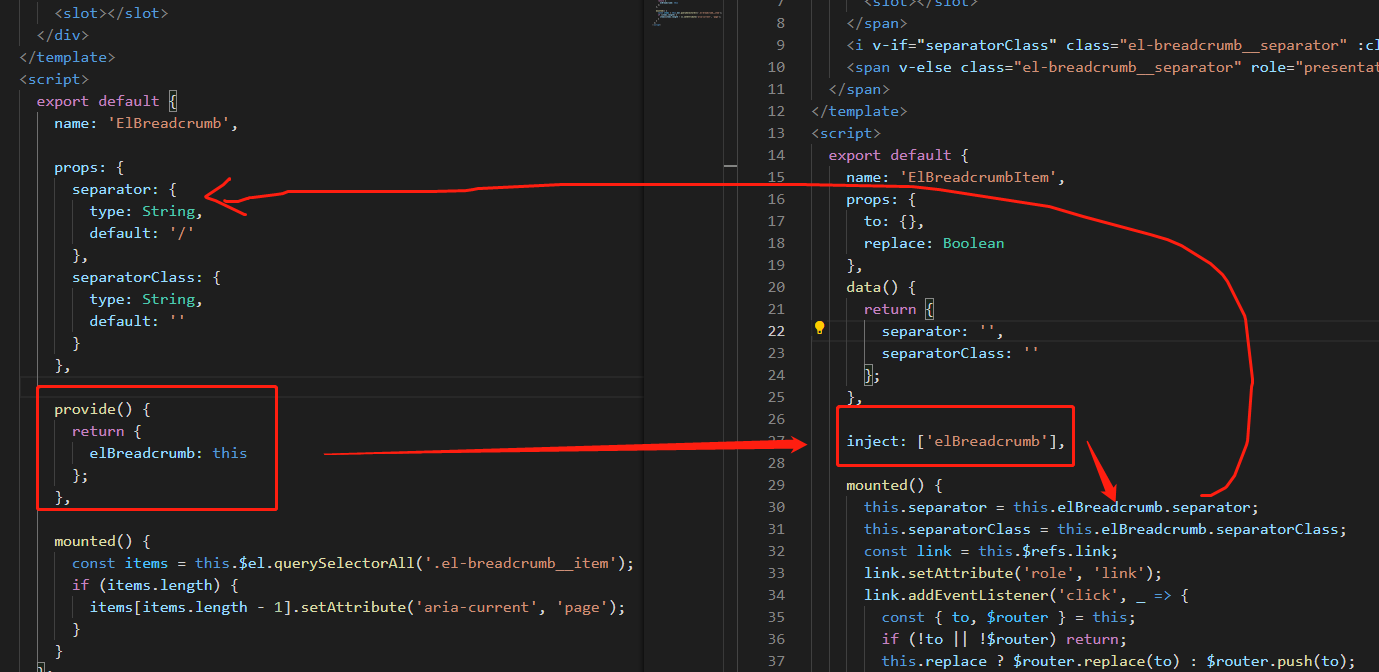vue 路由守卫 + 组件间的传值/插槽
一、路由守卫:https://blog.csdn.net/qq_26769677/article/details/101003337
全局前置守卫(beforeEnter)/路由独享(beforeEnter)/组件内的守卫(beforeRouteEnter、beforeRouteUpdate、beforeRouteLeave)
- to:进入到哪个路由去
- from:从哪个路由离开
- next:路由的控制参数,常用的有next(true)和next(false)
去除vue-router的#: https://www.jianshu.com/p/e899ccc4782d
二、组件间的传值
1. 父传子props、路由query、vuex
2. 子传父$emit、$ref、vuex
3. 祖先和后代(provide & inject )、vuex
4. 兄弟$parent、$root、vuex
一:父传子query、props
①、props
父:通过监听父组件的name值
<template> <div class="hello"> 父组件: <input type="text" v-model='name'> <!-- 引入子组件 --> <child :inputName='name'></child> </div> </template> <script> import child from './son' export default { name: 'father', data () { return { name: '', } }, components: { child } } </script>
子:通过子组件html部分的自定义属性,js的props的调用自定义属性值
<template> <div class="son"> 子组件: <span>{{inputName}}</span> </div> </template> <script> export default { name: 'son', data () { return { } }, props: { inputName: {
type: String,
default: '儿子名字'
} } } </script>
②、利用location
父:用组件router-link的to的query,用组件<router-link :to="{path: '子组件地址', query:{ }}">
<template> <div> <router-link :to="{ path: '/meishi/mChildren', query: {fid: ‘儿子接着’}}">传给子</router-link> </div> </template>
子:water监听$route
export default {
name: 'meishiChildren',
data () {
},
watch: {
'$route' (to, from) {
console.log(this.$route.query.fid)
}
},
methods: {}
}
二、子传父
①、$emit
子:通过v-on触发方法用this.$emit传给父信息
<template> <div class="hello"> <input type="button" name="" id="" @click="chilCall()" value="子调父" /> </div> </template> <script> export default { name: 'hello', 'methods': { chilCall(pars) { this.$emit('newNodeEvent', '我是子元素传过来的') } } } </script>
父:通过方法获取消息
<template> <div id="app"> <hello @newNodeEvent="parentLisen" /> </div> </template> <script> import hello from './son' export default { name: 'app', 'components': { hello }, methods: { parentLisen(evtValue) { //evtValue 是子组件传过来的值 alert(evtValue) } } } </script>
②、$ref (vue的dom节点) (https://www.jianshu.com/p/3bd8a2b07d57)
父
<template> <div id="app"> <button @tap='showSon'></button> <hello ref="jjjjj" /> </div> </template> <script> import hello from './son' export default { name: 'app', 'components': { hello }, methods: { showSon() { //获取组件dom节点信息,下有_props属性等可访问 console.log(this.$refs.jjjjj) } } } </script>
子
正常的组件,或原始组件
参考:http://www.bslxx.com/m/view.php?aid=2220
三、provide & inject (子拿上级)

四、插槽
https://www.cnblogs.com/chinabin1993/p/9115396.html
> 用slot替换组件里面的内容
1. 匿名插槽就是未命名
2. 具名插槽就是给插槽取名字,分开传
3. 作用域插槽:分发内容需求子组件的数据
.sync Update
父: <son :visible.sync="childShow"/>
子:this.$emit("update:visible",false);
https://www.jianshu.com/p/b149f9fd8178



